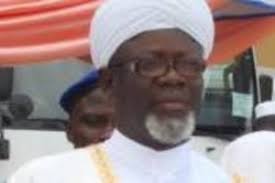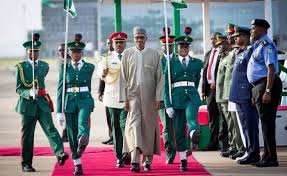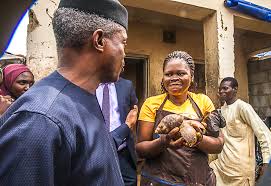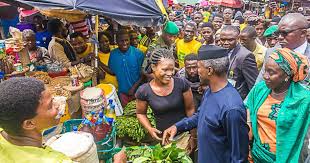Hunger is the Dividend of Democracy in Nigeria-Prof Olagoke
- By solomon2day
- On 10/04/2019
- In News
 Nigerians have continued to complain over the unabating hunger and poverty in the land.
Nigerians have continued to complain over the unabating hunger and poverty in the land.
Anti-people policies of the present administration have been identified as the major causes of the ugly situation, even though other causes abound.
Sadly, the Federal, State and Local Governments have been nonchalant in addressing the worrisome economic status of Nigerians, just as a report ranked Nigeria among the eight nations in the world, which are homes to the hungriest people in the world.
In this interview,the Founder, Spiritual Head and Grand Imam of Shafaudeen Worldwide, Prof. Sabitu Olagoke says hunger is the dividend of Democracy in Nigeria due to the absence of a leader that would transform the country into a prosperous land. Excerpts :
Hunger and poverty is in almost every home in Nigeria, are you not worried ?
The issue of hunger and poverty started to come unnoticed after the first coup of January 15, 1966 that led to the various military take over ab initio.
By training the military were never groomed to govern, but to defend the territorial integrity of Nigeria.
Between 1960 and 1970, the poverty index was around 15 per cent, it nose dived to 28.8 per cent, during the second republic, Alhaji Sheu Shagari’s administration, experienced corruption and impunity.
 The Muhammadu Buhari and Tunde Idiagbon regime tried hard to reverse the ugly trend, by introducing War Against Indiscipline(WAI) this brought about sanity and it positively affected the psyche of all Nigerians, although under a dictatorship.
The Muhammadu Buhari and Tunde Idiagbon regime tried hard to reverse the ugly trend, by introducing War Against Indiscipline(WAI) this brought about sanity and it positively affected the psyche of all Nigerians, although under a dictatorship.
However, the regime of Gen. Ibrahim Babangida soft pedaled and allowed the relaxation theory to take over, even though the War Against Indiscipline and Corruption(WAIC) was put in place, it turned out to be a game of deceit.
Despite all the mitigation measures, hunger and poverty defied all programmes-OFN, DFFRI, Better Life and so on.
This made Nigeria to look like an arid land where no plant could germinate.\
The regime of the late Gen. Sani Abacha recorded 65 per cent poverty index, while the fourth republic inherited 70 per cent poverty index according to a report by economic experts.
The truth of the matter is that Nigeria has not been able to produce a leader that is capable enough to transform the nation into a prosperous land.
Hunger could even be said to be the dividends of Democracy in Nigeria.
 When one considers the ever depreciating purchasing power of our Naira and ever increasing pump price of petrol, upon which the activities of industries and the transportation system depends, then one would reach the conclusion that all is not well.
When one considers the ever depreciating purchasing power of our Naira and ever increasing pump price of petrol, upon which the activities of industries and the transportation system depends, then one would reach the conclusion that all is not well.
The relocation of more than 800 industries to other nations from Nigeria, worsened the employment situation which none of the successive governments since 2007 have been able to address.
The recent balancing wheel of our economic equation, whereby government may assent to N30,000 new national minimum wage and at the same time increase in the Value Added Tax is in the works, would only serve to worsen the already bad situation.
This is so because the consequent effect would reflect on the already two digit inflation figure to be on the increase, while prices of commodities beginning from food stuff to other commodities would sky rocket beyond the reach of the already impoverished masses.
Economic experts have advised government to consider the downward review of the salaries and allowances of the ruling class, this should be effected.
For example, the Senate is the highest in rank with N14.2 million per month. This could be scaled down to N7 million.
The President and Vice President have been reported to receive N14 million and N12 million, respectively. This could also be cut to half.
If this preferred solution could be accepted, the cost of governance would be lower and manageable, while the size of government would require trimming, without necessarily affecting governance negatively.
Besides this, all political appointments including the ministerial ones would need to be monitored for effectiveness and accountability, for Mr. President to be able to take decisions on non performing Ministers.
For example electricity is essential to activate business activities from the industrial sector to the minute level, in order that we may be able to produce abundantly without recourse to importation and at low affordable costs to the people.
For poverty to be drastically reduced and to remove hunger from the tables of families in Nigeria occasioned by our over dependence on oil, attendant cases of fraud need to be effectively addressed.
 Furthermore, economic diversification and establishment of several industries by government and private individuals would reduce our over dependence on oil.
Furthermore, economic diversification and establishment of several industries by government and private individuals would reduce our over dependence on oil.
An independent economy would ever solve the problem of hunger and diseases.
Nigeria is known all over the world to be the most fortunate fertile land that is full of resources, but for the mismanagement syndrome of the resources and kleptocracy in governance, poverty would continue to slap us on our faces.
Government needs to work on the psyche of Nigerians, on our attitude, while the culture of philanthropy and selfless community service, need to be entrenched to create an environment that would be conducive enough for good idea germination for the benefit of all.
Nigeria Governance Hunger Poverty
